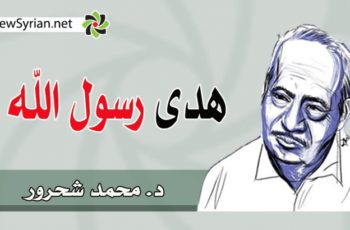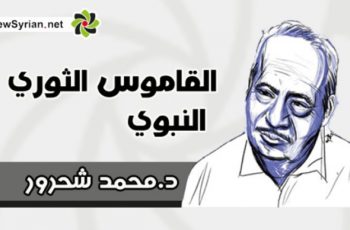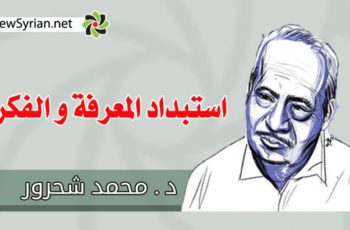Reading the Religious Text – A New Approach – Boston Lecturer
By Dr. Mohammad Shahrour
In my book “Al’Kitab W’al Qu’ran” (The Book and the Qu’ran), published in 1990, I addressed fundamental questions, such as: What is the basis for authority? What is the basis for our relationship to one another, or to the state? To what extent our ideas have been shaped by reading, or a misreading, of fundamental religious texts, particularly the Qu’ran?
If someone listened to programs about Islam on Arab televisions, he or she would see that the shaykhs preaching on TV say that Islam is good and Muslims are not good, as if Islam is something free in space. My understanding of meaning of Islam and of the situation of the Muslim world, starts with the definition of what Islam is. I differentiate between “Islam” and “Islamization”.
“Islam” as such is the holy Qu’ran. But “Islamization” is what people see in the phenomenon, which can be understood by sociology. There is no need for a new Islam, but there is a need for a new Islamization, because Islamization is bounded by history and geography, unlike Islam itself which is a pure teaching and commandment.
After the first century of Islamic history, new methods of Islamization were created, with principles such as usul al fiqih (jurisprudence) and ilim al-qalam (theology). These sciences were created by political officials, within the framework of an oppressive political authority. Therefore, it is impossible to find in the usul al-fiqih, both in its Sunni or Shi’a versions, a place for concepts such as “constitution”, “the rights of the people”, or “the rights of the government”. There is only elaboration on how to justify the power of ruler.
But now, the Middle East is facing new concepts such as constitution, pluralism, civil society, democracy and opposition. So, the problem is how these concepts can be introduced into the Islamic religious tradition.
I consider that, since religion has an important normative role in the Middle Eastern societies, it is impossible to ignore it. Liberals tried to do so, and they failed in their attempt to transport Western political formula to the Arab/Muslim states. Marxists wanted to impose a secularization, to deconstruct religion, and also failed.
Anyhow, there could be secularism in the Arab or Islamic states, but it would not solve anything. The Middle East problem is not secularism, but democracy. The secular state has been there for seventy years, it was imposed upon society and it did not work. A religious state was created in Iran and it is the strongest state in the Middle East, because it emerged from religion and appealed to the culture of the people among whom it appeared.
I began working with the analysis of the Qu’ran in 1970. For twenty years I worked on the book “Al’Kitab W’al Qu’ran”. In 1982 I found the difference between the kitab (book) and the Qu’ran. The Qu’ran is not the whole book, but parts of it that deal with prophecy. The shari’a (Islamic law) is the message, which is called “The Mother of the Book”. The Qu’ran and “The Mother of the Book”, prophecy and message, were put together and this is al-kitab (the book).
After establishing the difference between the message and the prophecy, I focused on al-furqan. It is said in the Qu’ran that the same al-furqan was given to Moses, Christ and to Mohammad. With this information I began to cross-examine the verses, and concluded that al-furqan are the Ten Commandments which are the same to all prophets, but the law is different between Moses and Mohammad, or Jesus Christ.
Therefore, the Ten Commandments are main pillar of Islam. Then I began to approach the problem of predestination, which is a notion widespread in the Arab/Muslim world. The Mu’tazilite ideas about the Qur’an is that it is a created text, and not the eternal word of God. This necessary for understanding the text in a different way.
The term “word” in Arabic has two different plurals. One plural of kalimeh (word), is kalimat. The other plural of kalimeh, is kalam. Kalimeh, with the plural kalimat, is word as an objective being. Kalimeh, with the plural kalam, is the word which, is pronounced. All the beings in the universe are words of God, because His words have no language. The word “sun” for God is the sun itself. The world “sun” in English is shams in Arabic, but for God “sun” is the sun itself. So, the Qur’an, as a word, is created, because if it is not created, it means that God is an Arab.
I concluded that there is no basis in the Qur’an for predestination. The only predestination that exists are the universal laws for all humanity. Such as the one who rules that everyone will die. It is not defined in advance how long each one will live, but it is only written that everyone will die some day.
After this theological part of my work, I analyzed the legal system of the Qur’an and identified three different parts in the legal aspects of the Qur’an: the code of moral, the legal system, and the rituals. From the analysis of the legal verses, I reached the possibility of pluralism and democracy in Islam.
For example the execution of murderer, which is the upper limit of punishment to murder, and nobody can exceed it. But if anyone wants to give a lower punishment, it is perfectly acceptable. As there are upper limits in the Qur’an, there are also lower limits in it, for example, incest is a lower limit of marriage rules.
I believe there is room for pluralism and civil society within the limits defined by God. Thee is no need for “fatwa” anymore, but for “istifta’a”, or referendum. If a society wants to abolish polygamy, they could do so, but only through a referendum, not by a force, so long as such referendum is bounded by the upper and lower limits set-out by God. Polygamy in Tunisia and Turkey was prohibited by force, in the name of progress and development, and the result is that if a man is caught with women and says that she is his second wife he goes to prison. But if he says she is a lover, it is accepted and both are freed.
I reviewed the principles of jurisprudence and I can say we are not in need for a “mufti” (the person who issues a fatwa). Instead, a nation bounded by the limits of God can exercise the process of legislation through a parliament. In reviewing the Qur’an, we can see the are two determinations for Haram (forbidden things). God only defines Haram. This is because haram has two implications, the first is that haram is exhaustive, the second is that it is eternal. To commit a murder is forbidden in Mecca, in Boston, in China, and in the seventh century as well as in the twentieth century. This is haram, and nobody is capable of making it halal, because it is absolute.
The Prophet’s doctrines are within the prohibited and non-prohibited domain. What Prophet Mohammed did in his life was to establish the rules of prohibited and non-prohibited things in the field of halal. But, he did not touch the field of haram. The field of halal is everything in exception to what is divinely defined as haram. Therefore, Islamic law served to organize everyday life, and a parliament has the same task of regulating the field of halal.
Boston Lecturer






(2) تعليقات
أحمد عياد
العزيز الغالى د/ شحرور
عندما قرأت كتابك الكتاب والقرآن فى أوائل التسعينات اشتريته بعدها اكثر من عشرين مره وأهديته فى كل مرة ولا أحتفظ بنسخة
لقد غيرت كتاباتك حياتى وصالحتنى على عقلى وعندما يتصالح الأنسان مع عقله يتصالح مع ربه.
فقط كتابك الأخير لم أقرأه فلم اعلم به الا قريبا وسف افعل اليوم
اما بالنسبة للمقال عاليه فانا اظن ان الغرب مرتاح لفكرة ان الأسلام سبب تأخر المسلمين وهم ينظرون للمحاولات التى يقوم بها امثال د / شحرور او نصر حامد ابو زيد عليه رحمة الله على انها توفيقيات مهما انبهروا بتنور اصحابها
اعتقد انه من غير المهم ان نهتم بخلق تفهم غربى لروعة الديانه المحمديه بل الأهم ان نجتهد من اجل ان يكون المسلمون المحمديون قوم رائعون
ربنا معاك
سعاد
Wonderful speech?